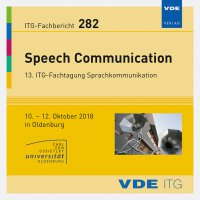Evaluation of Signal-Dependent Partial Noise Estimation Algorithms for Binaural Hearing Aids
Konferenz: Speech Communication - 13. ITG-Fachtagung Sprachkommunikation
10.10.2018 - 12.10.2018 in Oldenburg, Deutschland
Tagungsband: Speech Communication
Seiten: 5Sprache: EnglischTyp: PDF
Persönliche VDE-Mitglieder erhalten auf diesen Artikel 10% Rabatt
Autoren:
Klug, Jonas; Goessling, Nico; Doclo, Simon (Department of Medical Physics and Acoustics and Cluster of Excellence Hearing4all, University of Oldenburg, Germany)
Marquardt, Daniel (Department of Medical Physics and Acoustics and Cluster of Excellence Hearing4all, University of Oldenburg, Germany & Starkey Hearing Technologies, USA)
Inhalt:
Besides noise reduction an important objective of a binaural speech enhancement algorithm is the preservation of the binaural cues of both the target speaker as well as the undesired noise sources. Although the binaural minimum variance distortionless response (BMVDR) beamformer results in a good noise reduction performance and preserves the binaural cues of the target speaker, it distorts the binaural cues of the background noise, such that the target speaker and the background noise are perceived as coming from the same direction. Aiming at also preserving the binaural cues of the background noise, the BMVDR beamformer with partial noise estimation (BMVDR-N) was proposed, where a parameter allows to trade-off between noise reduction and binaural cue preservation of the background noise. In this paper, we propose a signal-dependent method to determine this trade-off parameter based on the coherence between the noisy input signals and the output signals of the BMVDR beamformer. Simulation results and subjective listening tests for a realistic acoustic scenario with diffuse cafeteria noise show that the proposed signal-dependent trade-off parameter for the BMVDR-N beamformer significantly improves the spatial quality compared to the BMVDR beamformer, while achieving the same speech intelligibility.


